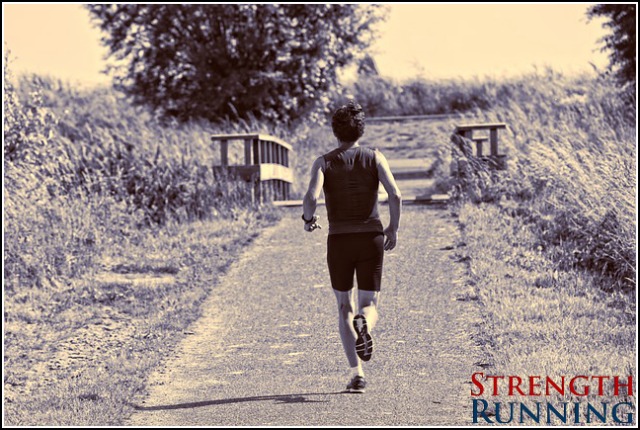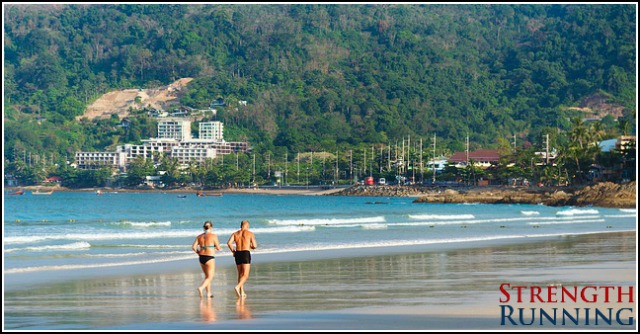It’s no surprise that running gets harder as you get older. Recovery is slower, VO² max is lower, and injury risks are more numerous. How can the older runner keep running strong – and healthy?

Running is something I intend to do for the rest of my life. But very soon I’ll need to address the limitations of my aging body.
I’m not 22 anymore. I can’t run a 1:13 half marathon off 6 hours of sleep, recover with 5 dirty Martinis, and still rock an 18 miler the next day for a long run.
The indiscretions of youth were fun… but they won’t work when I’m 52!
Running is also becoming a much more popular sport for older athletes. In fact, a study of the New York City Marathon from 1980 – 2009 found that:
“The percent of finishers younger than 40 years significantly decreased, while the percent of masters runners significantly increased for both males and females.”
As more and more people find running, it’s increasingly clear that many of them are older athletes.
My goal is to run as successfully as possible for as long as possible. This means quite a few things:
- Stay healthy (this should be a top goal for any 40+ runner)
- Maintain competence at skills (full range of motion, coordination, measures of strength, etc.)
- Feel good on most runs (free of pain, aches, niggles, etc.)
- Maintain a healthy body composition and preserve muscle mass (I want to look good. There, I said it!)
In effect, my running goals will transform into longevity goals as I get older (for more on longevity, I highly recommend Blue Zones for showing you the keys to living a longer, healthier life).
But running gets a lot harder for older athletes. How can we mitigate the effects of aging so we can keep running well into our golden years?
It starts with understanding why Master’s athletes start slowing down.
Why is running harder for Master’s runners?

Well, what isn’t hard about running when you get older? Most aspects of physical performance decline with age – it’s simply the reality of the aging process.
Specifically, you can expect:
- Decreased maximal heart rate
- Fewer blood capillaries
- Smaller and fewer muscle mitochondria
- Decreased VO² Max
- Lower levels of testosterone
- Decreased growth hormone production
- Decreased muscle mass
- Increased body fat
- Decreased muscular strength
These factors result in slower recovery and race times. The hormonal effects of aging are particularly pronounced; with lower levels of anabolic hormones like human growth hormone, testosterone, and IGF-1.
The hormones that supercharged your teenage and young adult years are greatly diminished, leading to lower muscle mass, reduced sexual drive, and poor recovery from workouts.
Combined with other age-related physical declines, runners can expect an annual performance decrease of about .7% – with more notable plunges around age 40 and 60.
By age 70, the average person will have lost 30-40% of their muscle mass by age 70.
Interestingly, a 2014 review article on aging and exercise published in the Journal of the American Academy of Orthopedic Surgeons concluded that:
Decades of research support the fact that much age-related deterioration is the result of the effects of sedentary lifestyles and the development of medical conditions rather than of aging itself.
This is fantastic news because it means that when it comes to the aging process, we are not passive bystanders.
We can mitigate the decline of being an older runner to prolong our running careers, our health, and even our lives.
How to Train Older Runners to Feel Young Again
There is a simple training strategy that will inject more youth into anybody’s running: strength training.
Just consider its myriad benefits and how they impact the older runner:
- Lifting weights triggers higher levels of testosterone and growth hormone (anabolic hormones that build muscle – and “big lifts” are better at producing more testosterone)
- Successful running for seniors depends on maintaining muscle strength and proper range of motion
- Lifting creates denser mitochondria, the “energy factories” of the cells, which decline as you get older
The hormonal component to this story is worth some further explanation.
See, running is catabolic – it breaks down muscle. This normally isn’t a problem because the recovery process rebuilds that muscle very effectively.
But that recovery process slows down as you get older. There are fewer hormones to get it done efficiently (and running doesn’t produce as large a surge of anabolic hormones as other types of exercise like strength training).
Not only does the hormone testosterone reduce the impact of catabolic hormones, it makes other hormones (like IGF-1) more anabolic as well.
After a hard weightlifting session, your body is swimming in muscle-building hormones. That simply doesn’t happen after a hard run! Coach Jay Johnson agrees, noting:
When you do strength work you get a hormonal stimulus that is different than you get running. Specifically, you up-regulate testosterone and human growth hormone, both anabolic hormones.
Anabolic simply means “building up.” Running is a catabolic, “breaking down,” activity.
When you view running the through the anabolic/catabolic lens, it makes sense that you would want to do some strength training to complement your running.
The lesson? If we want to run well into old age – injury-free and with some semblance of ease – we’ve got to lift weights.
Lifting Helps Non-Runners Too!
In addition to how lifting will benefit running, it’s also critical for older runners aged 65+ to promote healthy, long lives. Stronger seniors who have maintained more muscle strength are at a lower risk of falling – a significant cause of age-related trauma.
Doctors are noticing as well. Timothy Quinn, a professor of exercise science at the University of New Hampshire notes:
Older runners should try very hard to get to the gym to lift weights a few times a week.
This focus on strength training throughout the aging process will help runners (and non-runners alike) maintain their strength, flexibility, fitness, and resilience to injury.
How to Start Weightlifting (even if you’re a Master’s Runner)
I want to keep experiencing runs like this into old age!
Most forms of strength training are beneficial – no matter if you’re a master’s runner, senior, or a 14 year old just getting started!
But certain types of strength work have more benefits than others.
If you’re not yet comfortable with strength exercises, start with bodyweight strength training. It will improve your general strength, range of motion, coordination, and begin to counter the effects of muscle loss due to aging.
But if you’ve been doing bodyweight strength routines – like the Gauntlet or Tomahawk Workouts – regularly, it’s time to take the next step.
Because without progression, there’s no progress.
Now, it’s time to start weightlifting! Putting up heavier weight in the gym in a more structured “weight lifting” environment is how to get the powerful, full benefits of lifting:
- Neuromuscular coordination and enhanced running economy
- Power and the ability to recruit a higher number of muscle fibers
- Improved mitochondria development and testosterone production
- Stronger hypertrophy stimulus – preserving precious muscle mass
These are significant adaptations to lifting weights that won’t happen with bodyweight exercises. The stimulus simply isn’t strong enough.
Sign up here and you’ll get Strength Running’s free strength course. We’re going to cover a lot:
- The many reasons (even more than you realize) for starting a weight lifting routine
- Why bodybuilding and endurance workouts are a waste of time
- The type of exercises that build power, explosivity, and fast-twitch responsiveness
- The exact progression of exercises, sets, and reps that’s ideal for runners
- A video presentation that’s never before been public
Get it all here – your first lesson will be in your inbox within 5 minutes.